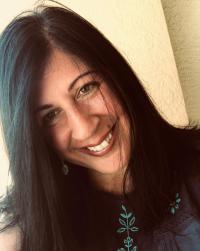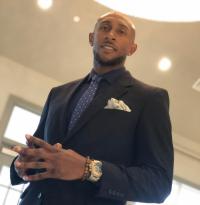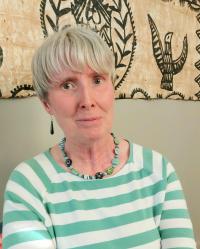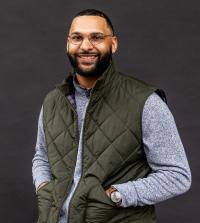Day 1 Opening Keynote: Stefania Agliano, with Bryan Hall II
Fragmented Pieces: A Story of Intimate Partner Violence and Resilience
This unique keynote is presented by a survivor of childhood trauma and exposure to intimate partner violence, with a narration of her mother and their family story woven throughout. Rarely are audiences given the opportunity to hear the generational impact of violence in this type of venue. Both adult and child perspectives are explored during significant moments in their lives, including issues related to immigration, parenting, mental health, substance abuse, child protection services, law enforcement response, services for battered women and the need to engage men in changing battering behaviors and gender-based violence. Critical moments in the life of this family where prevention efforts and collaborative engagement could have made a significant impact will be lifted up. This is a story of healing, redemption, loss, trauma across the lifespan, the impact of system and providers and the tenacity to succeed.
Listeners will walk away from this dynamic presentation with a deeper recognition of the following:
- The importance of assessing the needs and strengths of all family members when formulating intervention and treatment
- The importance of understanding the role of culture, positionality and identity
- The impact of complex trauma across the lifespan, as interwoven stories and the process of grieving, accepting loss and healing

Stefania M. Agliano, E.D., LM.S.W., received her doctorate from Northeastern University researching the impact of identity on facilitator efficacy, providing anti-trafficking and gender-based violence prevention education with adolescent males. Agliano is currently a clinical assistant professor in the School of Social Work graduate program at Sacred Heart University. She previously worked in child welfare services and child protection for over 25 years. Agliano is co-founder of I AM Training and Consultation Group LLC and has been a contributing member of efforts to eradicate trafficking inclusive of the development of various training curriculum, training hundreds of child welfare staff, law enforcement officers, probation officers and community providers on the local and national level using an anti-oppression practice lens.

Bryan Hall II, LCSW, M.S.W., received his graduate degree from University of Connecticut School of Social Work and has worked in child welfare, adult probation services and law enforcement for nearly 20 years. Hall is currently a clinical assistant professor at the Sacred Heart University School of Social Work. His clinical background consists of treating adolescents with persistent legal issues and/or mental health disorders. Hall is the co-founder of I AM Training and Consultation Group LLC. He has been instrumental in the development and facilitation of anti-racism and prevention programming aimed at educating participants on various topics inclusive of sexual exploitation and addressing youth violence designed for adolescents and associated practitioners.
Day 1 Closing Keynote: Nicki Weld
A Fence Instead of an Ambulance
In 1933, John Dewey stated, “We do not learn from experience … we learn from reflecting on the experience.” Critical reflection invites us to make sense of experiences through a process of describing, analyzing and questioning. Through this process, practice mistakes and difficulties can provide valuable learning that contributes to the development of practice wisdom for both the worker and other professionals.
In this engaging keynote address, Dr Nicki Weld will take listeners on a journey from transforming an example of poor practice into a reflective checklist to support safe, responsive practice. The sharing of tools, such as this reflective check list, can contribute to the development of ‘common ground’ between agencies. This supports collaboration and communication, both essential in the prevention of harm to children and vulnerable adults.
Listeners will walk away with:
- Ways to apply critical reflection in practice
- A reminder of professional dangerousness dynamics and enhanced awareness of these
- 10 reflective questions for all professionals and agencies to consider when working with children and families

Nicki Weld, Ph.D., is a senior lecturer at the University of Auckland, and director of CNZN Ltd, New Zealand. Over the past 30 years, she has worked in a variety of human service and child protection roles, including professional leader for social work in general health, senior social worker, supervisor, senior child protection trainer and as a national social work advisor within the New Zealand government sector and non -government sector. Weld is the author of seven human service books and the primary creator of the internationally applied Three Houses tool.
Day 2 Opening Keynote : Gaelin Elmore
Be the Difference: Your Commitment to Belonging Changes Lives
Would you believe me if I told you that a foster child becoming a “success story” or a “statistic” has way more to do with you than it does the child? I’ve been labeled a success story for the things that I’ve been able to accomplish thus far in life – and I am proud and thankful for where I am. But that’s not the complete picture. There were moments in my life when I was well on my way to being a statistic, and if I’d had it my way, I would have been.
If not for select people coming into my life at the right time, I would not be here. The youth you serve need a lot of things, but what they need most are adults in their life committed to being different. When you commit to be the difference, we have a chance to meet their biggest and most important need – the need to belong. And belonging changes lives. I know because it changed mine.
Listeners will learn:
- About the unique belonging deficit that foster youth must navigate
- How to utilize SOP principles to cultivate belonging
- How to maximize their positive difference through the CARE model

Gaelin Elmore
After a childhood filled with trauma, abuse, neglect and homelessness, Gaelin Elmore believed his issues would be solved if he became successful. From college football to signing an NFL contract, Elmore was driven, even comforted, by this assumption. It wasn't until he achieved what he thought was "success" (making it to the NFL), that he finally realized he had been wrong all along. And so, Elmore retired as a rookie to begin his journey of self-love, self-discovery and belonging. That journey has led Elmore here today, and to stages all across the country, aiming to inspire, encourage and equip others, to erase the belonging gap plaguing youth with adverse childhood experiences.
Day 2 Closing Keynote: Keisha Clark
A Beginners Mindset: Getting Past the Door and Into the Heart
We must trust and consider that BIPOC families who are disproportionately represented in child welfare are proficient in creating safety for their children and communities. Systems have historically rendered a disservice to their minds, bodies and spirits. Repetition of traditional child welfare training and practices must be deconstructed to remove the walls of compliance transactions and build bridges to mutual relationships.
Cultural humility and trauma-informed practice are the solutions to getting past the door and into the heart. But first we must start with a beginner’s mindset; by letting our expertise take a back seat and allow the families we serve to climb into the driver’s side and take us for a ride on a passport into their world. Buckle up! It’s going to get bumpy!
Learning objectives:
- Breaking down the silos to partnering for prevention, permanency and preservation
- Recognizing biases and leverage differences to work within the cultural contexts of communities through a cultural responsiveness lens
- Assessing and applying characteristics from your personal relationships to commit to authentic collaborative engagement

Dr. Keisha Clark’s experiences growing up in the segregated south and surviving a traumatic event uniquely position her with lived expertise in cultural humility and trauma- informed practice. She currently leads the Office of Equity in San Diego County for Child Welfare Services, where she supports the organization’s efforts to become an antiracist system; tackling racial bias, disproportionality, disparities, inequities, diversity, inclusion, and belonging issues involving African Americans, immigrants/refugees, other communities of color as well as gender and sexual minorities. She has provided consultation to develop transformational leadership, antiracism and mindfulness curriculum at San Diego City College, Emory University and University of California San Diego. Clark’s education includes a graduate degree in Criminal Justice, and a doctorate degree in Management with a concentration in Organizational Leadership.
